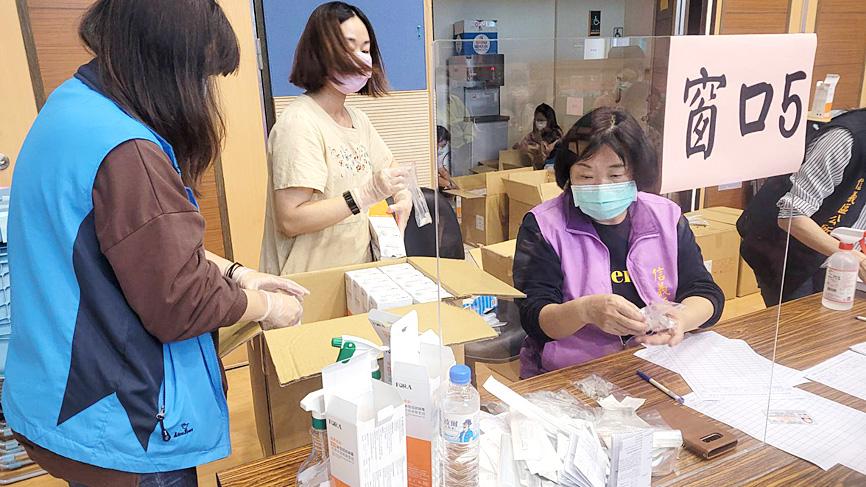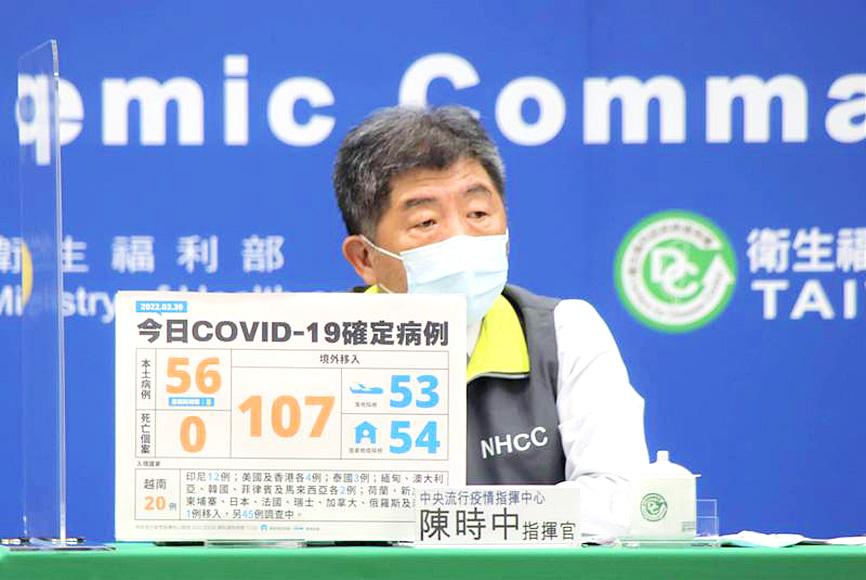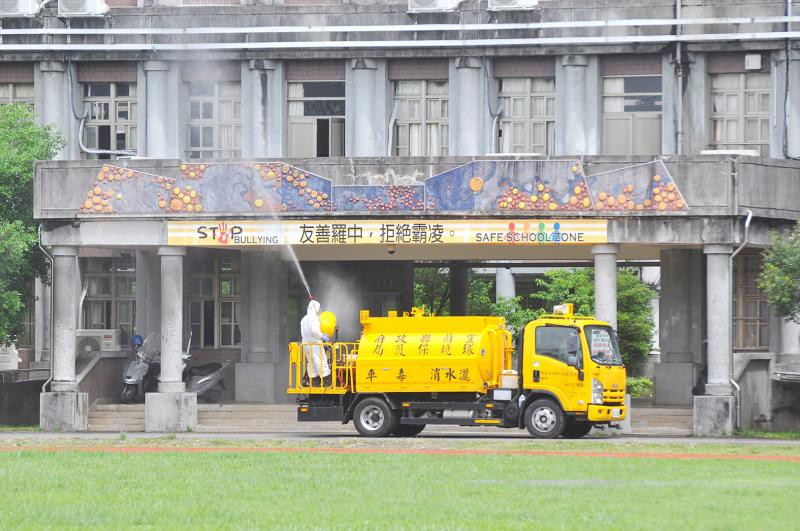A wide-scale COVID-19 screening program would be conducted in Keelung, offering government-funded at-home rapid test kits to 360,000 local residents in light of a cluster that has expanded to 68 cases, Minister of Health and Welfare Chen Shih-chung (陳時中) said yesterday.
The virus seems to have been spreading in communities in Keelung for quite some time and it would be difficult to find undetected cases at testing stations, Chen said during a visit to Keelung.
The details of the screening program, including the method to distribute and collect the kits, are still being discussed, said Chen, who heads the Central Epidemic Command Center (CECC).

Photo: Lu Hsien-hsiu, Taipei Times
The CECC yesterday reported 56 local COVID-19 infections.
There are 19 local transmission chains with unknown infection sources, it said, adding that the cluster in Keelung is the most concerning, as it involves several businesses and a school.
The Keelung cluster added 19 new cases yesterday, Chen said.

Photo courtesy of the Central Epidemic Command Center
It does not seem to be coming under control, so it must be closely monitored, he said.
A cluster involving workers at a chemical plant in Kaohsiung seems to be under control, as no new cases have been found in the past three days other than people who were already isolating at home, including one case confirmed yesterday — a family member of a previous case, Chen said.
Two local cases yesterday were linked to a cluster of infections in Taitung, he said.

Photo: CNA
They are a colleague of a previous case and a participant at a religious event that another previous case attended, he said.
The Taitung cluster has expanded to 11 cases, Chen said.
Six local cases were yesterday linked to a cluster involving workers at a technology firm in New Taipei City’s Shulin District (樹林), with four among them — three workers and a family member of a previous case — testing positive while isolating, while the other two workers had symptoms when under self-health management, he said.
The Shulin cluster has expanded to 29 cases, he said.
Genome sequencing showed that three cases in the Shulin cluster were infected with a new strain of the Omicron BA.2.3 subvariant of SARS-CoV-2, Chen said.
Six new cases were confirmed in a cluster involving residents of an apartment building in New Taipei City’s Jhonghe District (中和), Chen said.
They were: Two family members, two people at a clinic that previous cases had visited, a student at a cram school attended by a previous case and a person who visited the same place as a previous case, Chen said.
Twelve of yesterday’s new cases are linked to a cluster involving workers at a power plant construction site in Taoyuan and its dormitories in Hsinchu County, he said, adding that one of the cases is concerning, as he is a worker at a separate, larger construction site, so expanded testing is being conducted.
The Taoyuan cluster has expanded to 78 cases, he said.
A new case is linked to a cluster involving a salesperson in New Taipei City’s Sanchong District (三重), with genome sequencing showing that the woman is infected with the BA.2 Omicron subvariant, the 23rd Omicron strain detected in Taiwan, Chen said.
Another case is a family member of a case in a Taipei cluster linked to a care worker and her employer, he said.
Other cases were: a resident of New Taipei City’s Sindian District (新店) who works at a massage parlor in Taipei; a police officer who works at a centralized quarantine facility in New Taipei City; two dance instructors in Taoyuan who taught classes in Taipei and Yilan; two Taipei residents and a Keelung resident who works in Kaohsiung who attended a wedding in Taichung; and a case reported in New Taipei City yesterday morning, Chen said.
The CECC yesterday also confirmed 107 imported cases.

A magnitude 5.6 earthquake struck off the coast of Yilan County at 12:37pm today, with clear shaking felt across much of northern Taiwan. There were no immediate reports of damage. The epicenter of the quake was 16.9km east-southeast of Yilan County Hall offshore at a depth of 66.8km, Central Weather Administration (CWA) data showed. The maximum intensity registered at a 4 in Yilan County’s Nanao Township (南澳) on Taiwan’s seven-tier scale. Other parts of Yilan, as well as certain areas of Hualien County, Taipei, New Taipei City, Taoyuan, Hsinchu County, Taichung and Miaoli County, recorded intensities of 3. Residents of Yilan County and Taipei received

Taiwan has secured another breakthrough in fruit exports, with jujubes, dragon fruit and lychees approved for shipment to the EU, the Ministry of Agriculture said yesterday. The Animal and Plant Health Inspection Agency on Thursday received formal notification of the approval from the EU, the ministry said, adding that the decision was expected to expand Taiwanese fruit producers’ access to high-end European markets. Taiwan exported 126 tonnes of lychees last year, valued at US$1.48 million, with Japan accounting for 102 tonnes. Other export destinations included New Zealand, Hong Kong, the US and Australia, ministry data showed. Jujube exports totaled 103 tonnes, valued at

TRUST: The KMT said it respected the US’ timing and considerations, and hoped it would continue to honor its commitments to helping Taiwan bolster its defenses and deterrence US President Donald Trump is delaying a multibillion-dollar arms sale to Taiwan to ensure his visit to Beijing is successful, a New York Times report said. The weapons sales package has stalled in the US Department of State, the report said, citing US officials it did not identify. The White House has told agencies not to push forward ahead of Trump’s meeting with Chinese President Xi Jinping (習近平), it said. The two last month held a phone call to discuss trade and geopolitical flashpoints ahead of the summit. Xi raised the Taiwan issue and urged the US to handle arms sales to

BIG SPENDERS: Foreign investors bought the most Taiwan equities since 2005, signaling confidence that an AI boom would continue to benefit chipmakers Taiwan Semiconductor Manufacturing Co’s (TSMC, 台積電) market capitalization swelled to US$2 trillion for the first time following a 4.25 percent rally in its American depositary receipts (ADR) overnight, putting the world’s biggest contract chipmaker sixth on the list of the world’s biggest companies by market capitalization, just behind Amazon.com Inc. The site CompaniesMarketcap.com ranked TSMC ahead of Saudi Aramco and Meta Platforms Inc. The Taiwanese company’s ADRs on Tuesday surged to US$385.75 on the New York Stock Exchange, as strong demand for artificial intelligence (AI) applications led to chip supply constraints and boost revenue growth to record-breaking levels. Each TSMC ADR represents